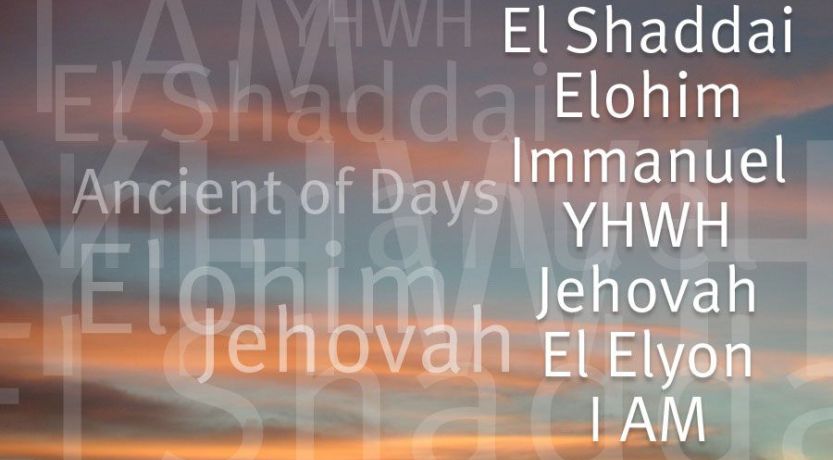The Bible uses many names of God. What are these names, and what are their meanings? They teach us important lessons about the character and power of God.

Is there significance to God’s many names?
Yes, throughout the Bible God refers to Himself by different names and titles. Each name reveals an aspect of His nature, character and power. For example, the name Elohim, used in Genesis 1, is a plural noun that normally takes a singular verb. This and other scriptures indicate that God is composed of more than one being. The Bible doesn’t teach that there is a “sacred name” for God.
What is God’s name? When we study the Bible in English, it can seem like God has two basic names: God and LORD.
But when we dig deeper, we discover that in the original languages He has many more names—some of which include multiple variants. These names are often simply translated as God and LORD in modern English translations.
Names of God in the Bible
View a chart containing more names of God.
When we study the meanings of these names, we learn that they teach us many truths about our Creator. They each reveal something important about God’s power, nature, character or acts. We can learn a lot about our Creator by studying the meanings of His many names.
What is the significance of names in the Bible?
In the Bible, names are not just used to identify someone, but often describe certain qualities and characteristics of the person who bears the name.
For instance, the Hebrew name Jacob (Genesis 25:26; Genesis 27:36) means “taking hold of the heel, supplanter, layer of snares.” When we read Jacob’s story, we find that this name perfectly describes his character throughout much of his life (Genesis 25-32).
However, after Jacob wrestled with God all night, God changed his name to Israel (which means “struggle with God” or “he prevails with God”) (Genesis 32:28).
Therefore, in the Bible names reveal important information about the person or being.
But what about the names of God in the Bible? What are their meanings? What do they reveal about Him?
God refers to Himself by many different names in the Bible, and with each name we learn more about Him. Often the first time one of His names is used in the Scriptures gives us insight into the quality or characteristic of God that He is revealing by that name.
Let’s explore some of the names God uses for Himself in the Bible.
Elohim
The first word translated as God in the Bible is found in Genesis 1:1: “In the beginning God created the heavens and the earth.” God here is from the Hebrew word Elohim. It is the most-often-used Hebrew word translated as God in the Old Testament. It is translated as God well over 2,300 times.
Elohim is revealed here as the Creator of the heavens and the earth.
However, that is not all that the word reveals. Elohim is a plural word. It is the plural of Eloah—a name that is only used 52 times in reference to the true God in Scripture (41 of those in the book of Job).
In Hebrew, when the “-im” suffix is added at the end of a word, it makes the word plural (much like the “-s” suffix in English and Spanish).
The context shows that Elohim can be used of the true God or of false gods. In fact, Elohim is translated as gods—in reference to false gods—over 240 times (for example, Exodus 20:23).
The fact that Elohim is a plural word also reveals a vital truth about the true God. It shows us that there is more than one member of the Godhead. We see this understanding of the plural nature of Elohim in Genesis 1:26:
“Then God said, ‘Let Us make man in Our image, according to Our likeness; let them have dominion over the fish of the sea, over the birds of the air, and over the cattle, over all the earth and over every creeping thing that creeps on the earth.’”
Throughout the years, many theologians have grappled with the question of how God can be both singular and plural. The use of the plural noun Elohim in Genesis 1 introduces us to a truth that becomes clearer throughout the rest of the Bible: that God isn’t alone. He, along with the Word, dwelt together from eternity and are God. See John 1:1-3, 14. For further explanation about Elohim read our booklet Getting to Know the God of the Bible.
The Bible also reveals that human beings were created with the potential to enter the God family as sons and daughters (2 Corinthians 6:18).
You can learn more about this amazing truth about God’s nature in our articles “God Is One,” “Children of God” and “What Did the Apostles Believe About God?”
El
El is a shortened form of Eloah and Elohim. El emphasizes God’s might and power. It is translated as God many times in the Old Testament.
El is sometimes used in conjunction with other words to describe various aspects of God’s nature and character. Here are some examples:
- El Shaddai: The word shaddai means “most powerful” or “Almighty.” So, when put together with El, the name means “God Almighty” or “God the Most Powerful.” It emphasizes God’s unmatchable power and strength. According to The Complete Word Study Old Testament, this name is used to describe God 48 times in the Old Testament (p. 2371). (Examples include Genesis 17:1; 28:3; Exodus 6:3.)
- El Elyon: The adjective elyon means “elevated, high, exalted” (The Complete Word Study Old Testament, p. 2349). So, when put together with El, the name means “God the Most High” or “the Most High God.” This emphasizes God’s preeminence and ultimate power and authority over everything. (Examples include Genesis 14:18-20; Psalms 78:35; 47:2; 97:9.) It is interesting that in Isaiah’s account of Lucifer’s attempted rebellion, Lucifer (who became Satan) used this name as he was attempting to overthrow God’s throne and become “the most high” himself (Isaiah 14:14). This was an attempt that, of course, failed miserably.
- El Olam: The noun olam means “eternity, the distant future, duration, perpetual, without end, always, everlasting time” (ibid., pp. 2347-2348). So, when put together with El, the name means “the Everlasting God” or “the Eternal God.” (This name is found in Genesis 21:33.)
- El Mosha’ah: The noun mosha’ah means a “saving act, deliverance” or “salvations.” When put together with El, the name means “God of Salvation” or “God the Deliverer.” This emphasizes God’s character of love and His power over all things. He is the God who loves and cares about His people so much that He saves and delivers them. (This name is found in only one place in the Bible, Psalm 68:20.)
El is often found embedded in the names of individuals in the Bible. When you see a name that has el within it, it is often a name proclaiming an element of God’s power and character.
Some examples include Israel (“one who prevails with God”), Samuel (“His name is El” and “heard of God”), Eleazar (“God has helped”), Immanuel (“God with us”), Michael (“who is like God”), Elimelech (“my God is king”) and Elijah (“my God is Yah”).
Adonai
The word Adonai is an emphatic form of the noun Adon. Its basic meaning is “‘lord’ in the sense of a superior, master, or owner” (Zondervan Expository Dictionary of Bible Words, p. 416).
The word emphasizes the authority of the one it describes. But, unlike other names of God (such as YHWH or “I AM”), its usage in the Bible isn’t limited to describing only God. It is sometimes used to identify human beings with authority (Genesis 40:1).
When used for God, Bible translators usually translate Adonai as “Lord” (with one capital letter). The name is often used along with YHWH or Elohim to give a double emphasis to God’s ultimate power and authority. Here are some examples:
- “O LORD [YHWH], our Lord [Adonai], how excellent is Your name in all the earth!” (Psalm 8:9).
- “For I know that the LORD [YHWH] is great, and our Lord [Adonai] is above all gods” (Psalm 135:5).
“I AM”
In Exodus 3 we read the account of God talking to Moses from a burning bush and revealing that Moses would be used to deliver the Israelites from Egyptian slavery. Moses asked God what name he should use to identify Him when he spoke to the children of Israel (Exodus 3:13).
God answered, “I AM WHO I AM. … Thus you shall say to the children of Israel, ‘I AM has sent me to you’” (verse 14). It may sound odd that God called Himself “I AM.” Why would He call Himself “I AM”?
The Hebrew word for “I AM” is hayah. In this context, it essentially means “to be, to exist.”
What God was saying is that He is the God who simply is. He has no source of origin, no progenitor, no beginning. He came from no physical place. He simply exists and always has existed.
In ancient times, people were often identified by who their parents were or where they came from. For instance, Joshua is identified as “Joshua the son of Nun” (Numbers 11:28) and Ishmael is called “the son of Hagar the Egyptian” (Genesis 21:9). The infamous giant slain by David was known as “Goliath, from Gath” (1 Samuel 17:4). The apostle Paul was originally known as “Saul of Tarsus” (Acts 9:11).
So, when God identified Himself as “I AM,” He was making the statement that He has no father or mother who created Him. He has no genealogy and no physical source of origin.
He simply is and always has been.
To learn about how and why the One who later came to earth as Jesus Christ called Himself “I AM,” read “Was Jesus Created?” and “Jesus in the Old Testament?”
LORD (YHWH)
The most often used name for God is translated as LORD in the Old Testament. The first time it occurs is in Genesis 2:4. It occurs over 6,500 times.
It consists of four Hebrew consonants, which have been represented in English in various transliterations: YHVH, JHVH, IHVH, JHWH and YHWH. These four consonants have been given a name—the tetragrammaton (a Greek word that simply means “four letters”). Anytime you read the all-capitalized word “LORD” in the Bible, it is translated from the tetragrammaton. (When you read “Lord” without all capital letters, it is usually translated from Adonai.)
The Jews considered the word YHWH too sacred to be spoken, so they intentionally did not preserve the pronunciation. Today no one knows exactly how it was to be pronounced.
The Hebrew language consists of 22 consonants (most Bibles list these consonants in Psalm 119 as subheads over every eight verses). Vowel sounds are indicated by placing various dots or small lines around these consonants.
The Jewish scribes who preserved the Hebrew Scriptures by hand intentionally left off the vowel points for this word from their manuscripts—leaving only the four consonants (YHWH).
Therefore, there is no definitive pronunciation of this word. Commonly used pronunciations like Jehovah or Yahweh are just guesses. Most scholars believe “Yahweh” is probably a more likely pronunciation, since the hard j sound isn’t used in the Hebrew language.
But what’s important isn’t the pronunciation. What’s important is the meaning of the name.
The meaning of YHWH is similar to the meaning of “I AM.” Its basic meaning is “the self-existing One” or “the Eternal.” It emphasizes that God has lived for eternity—He had no beginning and will have no end. He was not brought into existence at any point in history by any other being—He is self-existent.
Mounce’s Complete Expository Dictionary of Old and New Testament Words provides this helpful explanation of these two names: “The connection between ‘I AM’ and ‘Yahweh’ is one of verbal person. ‘I AM’ is the first person form of the verb ‘to be’ … while ‘Yahweh’ represents the third person from of the same verb, perhaps ‘HE IS’ or ‘HE WILL BE’” (p. 422).
Many other scriptures elaborate on the essential truth behind the meaning of the name YHWH:
- “Blessed be the LORD God of Israel from everlasting to everlasting!” (Psalm 41:13).
- “Before the mountains were brought forth, or ever You had formed the earth and the world, even from everlasting to everlasting, You are God” (Psalm 90:2).
- “For thus says the High and Lofty One who inhabits eternity, whose name is Holy: ‘I dwell in the high and holy place, with him who has a contrite and humble spirit, to revive the spirit of the humble, and to revive the heart of the contrite ones’” (Isaiah 57:15).
- “But you, Bethlehem Ephrathah, though you are little among the thousands of Judah, yet out of you shall come forth to Me the One to be Ruler in Israel, whose goings forth are from of old, from everlasting” (Micah 5:2).
Like the name El, YHWH is also used in conjunction with other attributes of God to form other derivatives of the name YHWH.
Here are a few examples of this:
- YHWH Rapha: The verb rapha means “to heal,” “cure” or “make healthful.” So when put together with El, the name means “God Who Heals” or “God Our Healer.” We find this name for God in Exodus 15:26: “For I am the LORD who heals you.” Many Bible verses show God’s power to heal sicknesses and to raise the dead back to life (Psalms 41:3; 107:20; 146:8; 147:3; Isaiah 53:5).
- YHWH Jirah: Most English Bibles translate the meaning of this name clearly in the text of the one place it’s used: “The-LORD-Will-Provide” (Genesis 22:14). Many Bible passages elaborate on this aspect of God’s character—that He loves to bless us and provide for our needs (Psalms 65:9-13; 107:9; 145:16; Matthew 6:26; Philippians 4:19; James 1:17).
- YHWH Nissi: Most English Bibles also make this name clear in their translation: “The-LORD-Is-My-Banner” (Exodus 17:15). A banner was a flag or standard that would go before an army or a group to identify, from afar off, who and where they were. This name shows that we should always look to God as our protector when we face life’s battles. We look to Him to help us achieve spiritual victories (1 Corinthians 15:57).
- YHWH Tsidkenu: The Hebrew word tsidkenu (or tsedeq) means “righteousness, straightness, or what is right and just.” We find this name in two places in the Bible, both in the book of Jeremiah: “THE LORD OUR RIGHTEOUSNESS” (Jeremiah 23:6, see also Jeremiah 33:16). This name emphasizes that God’s character and ways are perfect, right and just. There is no fault in God; His acts, ways and judgments are always righteous (Deuteronomy 32:4; Psalms 7:11; 145:17; 1 John 1:5). God gave His 10 Commandments to help us learn how to be righteous like He is (Psalm 119:172).
- YHWH Tsaba’: The Hebrew word tsaba’ is a noun describing an army—a mass of soldiers ready for war. English Bibles usually translate this word as host, an old English word for an army or a large throng of soldiers organized for war. So this name is translated in most translations as: “The LORD of hosts” (Psalm 24:10). It is used 235 times in the Old Testament. This name emphasizes God’s supreme power and leadership over the angelic armies of heaven. The Bible describes God’s angelic armies as “innumerable” (Hebrews 12:22; see also Revelation 5:11). The name “LORD of hosts” describes the prophetic image of Jesus Christ’s return to earth—followed by hosts of angels who will be joined by the resurrected saints (Matthew 25:31; Mark 8:38; 1 Thessalonians 3:13; Jude 1:14). It emphasizes God’s absolute and unrivaled power and authority.
- YHWH Shalom: The word shalom simply means “peace.” But used in conjunction with God’s name, it specifically describes a peace that comes only from God. This name is used only once in the Bible, in Judges 6:24: “The-LORD-Is-Peace.” This name teaches us that true peace (peace of mind, peace in life and peace for our world) comes only through God and His ways. The Bible has a lot to say about how God brings peace (Psalms 23:1-6; 119:165; Isaiah 26:3, 9:6; John 14:27; Philippians 4:6-7; 2 Thessalonians 3:16).
There is one Bible passage that is unique because it contains the tetragrammaton as well as the other major names of God—all packed into one single verse:
- “For the LORD [YHWH] your God [Elohim] is God [Elohim] of gods and Lord [Adon] of lords, the great God [El], mighty and awesome, who shows no partiality nor takes a bribe” (Deuteronomy 10:17).
Learning from God’s different names in the Bible
We hope this article has helped you gain a deeper understanding of the many names your Creator has used to reveal Himself. The names of God are not empty phonetic sounds, but are deeply meaningful proclamations of His power, His character and the many things He does for His people.
By learning about the many names of God in the Bible, we can come to know Him better.
|
List of the Names of God |
||
|
Hebrew or Greek Name |
Basic Meaning |
First Scriptural Use |
|
Elohim |
Mighty Ones |
Genesis 1:1 |
|
El |
Strong, Mighty, Mighty One |
Genesis 14:18 |
|
El Shaddai |
Almighty God, Most Powerful |
Genesis 17:1 |
|
El Elyon |
The Most High God |
Genesis 14:18 |
|
El Olam |
The Everlasting, Eternal God |
Genesis 21:33 |
|
El Mosha’ah |
God of Salvation, God the Deliverer |
Psalm 68:20 |
|
Adonai |
Master, Superior, the Highest Authority |
Exodus 23:17 |
|
“I AM” |
The God who has existed for eternity and has no beginning or end |
Exodus 3:14 |
|
YHWH |
The Eternal, the Self-Existing God |
Genesis 2:4 |
|
YHWH Rapha |
The Eternal Who Heals |
Exodus 15:26 |
|
YHWH Jirah |
The Eternal Will Provide |
Genesis 22:14 |
|
YHWH Nissi |
The Eternal Is My Banner |
Exodus 17:15 |
|
YHWH Tsidkenu |
The Eternal Our Righteousness |
Jeremiah 23:6 |
|
YHWH Tsaba’ |
The Eternal of Hosts/Armies |
1 Samuel 1:3 |
|
YHWH Shalom |
The Eternal of Peace |
Judges 6:24 |
|
New Testament |
||
|
Theos |
God, One who is divine |
Matthew 1:23 |
|
Kyrios |
Master, supreme in authority |
Matthew 1:20 |
|
Despotes |
Master, Lord |
Luke 2:29 |
|
Iesous |
“Jesus” |
Matthew 1:1 |






